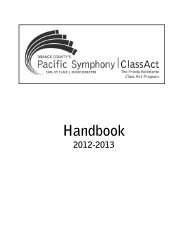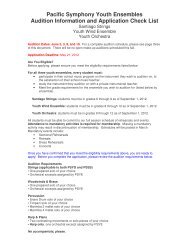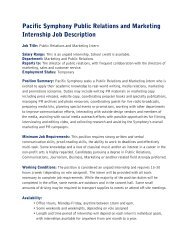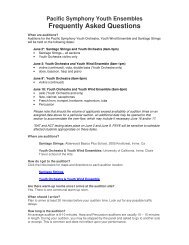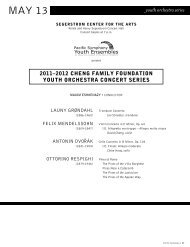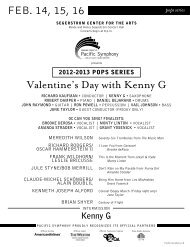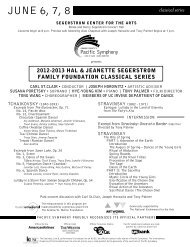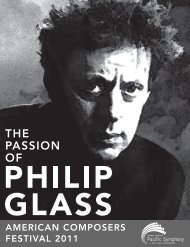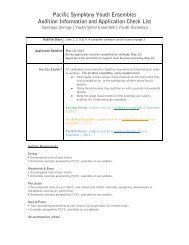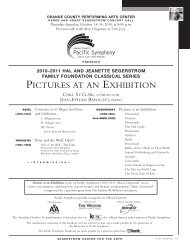Program Notes - Pacific Symphony
Program Notes - Pacific Symphony
Program Notes - Pacific Symphony
You also want an ePaper? Increase the reach of your titles
YUMPU automatically turns print PDFs into web optimized ePapers that Google loves.
NOTES<br />
Ellington never composed “crossover” music. In pursuing<br />
his artistic project he sidestepped the available European<br />
genres of high seriousness: symphony, opera, oratorio.<br />
When a work like Harlem or Night Creatures would involve<br />
an orchestra, he farmed out the orchestration (usually to<br />
the Juilliard-trained Luther Henderson) and made sure that<br />
the music that mattered was assigned to his own musicians.<br />
Though it still maddens some critics, he never played the<br />
role of the isolated genius. For Ellington composition was<br />
collaborative and open-ended; his reluctance to terminate<br />
things (compositions or marriages), often described as<br />
a superstition, can also be taken as an aesthetic stance.<br />
Refusing to merge the idiom of jazz with the forms and<br />
ensembles of European concert music, he set himself on a<br />
different course from Gershwin or Copland. . . European<br />
forms. . . were simply irrelevant. . . to the experiences he<br />
strove to represent musically. The scope of ideas, images,<br />
and emotions of his music was panoramic, from political<br />
protest (“Jump for Joy”) to religious faith (“Heaven”),<br />
from the African past (“Ko-Ko”) to the American present<br />
(“The Air-Conditioned Jungle”), from Rio to Tokyo.<br />
Daniel Schnyder, being European-born, came to Ellington without<br />
the prejudices once afflicting American classical musicians. His<br />
formal training in Zurich, in flute and composition, was rigorously<br />
“classical.” But he equally absorbed the influence of jazz. He says:<br />
I live around the corner from where Duke used to live<br />
in Harlem. I “Take the A Train” to get home from<br />
mid-Manhattan. Ellington’s greatness is of course multidimensional.<br />
He worked with great individual players and<br />
formed his sound from their individual voices – rather than<br />
getting performers to give up a part of their individuality<br />
in order to form the sound of a great orchestra. In writing<br />
for instrumentalists like Johnny Hodges and Ben Webster,<br />
Duke is actually similar to Bach. Today’s conductors<br />
refer to their orchestras as their instrument – that is the<br />
opposite of what Ellington believed in. He recorded with<br />
John Coltrane and Charles Mingus in a quartet setting. A<br />
beautiful album! But the three individuals come from three<br />
different planets. I also believe in something like that. My<br />
bass trombone concerto is composed specifically for David<br />
Taylor, who has reinvented the instrument. My goal was<br />
to write a solo trombone part that would be so natural to<br />
Taylor that it would sound as if it were being invented on<br />
the spot – and then in the next generation would be taken<br />
up by trombonists all over the place. Which is exactly what<br />
has happened.<br />
Schnyder also observes of Ellington that “he was one of the first jazz<br />
composers to use Arab scales and rhythms, as in Caravan.” Schnyder<br />
is himself an omnivorous creator, drawing on Renaissance polyphony,<br />
Schubert and Mahler, Ellington and Gershwin, Arabia and Africa. He<br />
is also, no less than Ellington, a gifted performer and improviser (on<br />
the saxophone). Like Ellington, he espouses multiple musical worlds.<br />
* * *<br />
Daniel Schnyder was born in Zurich and now lives in New York City.<br />
His vast catalogue of compositions includes commissions from New<br />
York’s Orpheus Chamber Orchestra, the Milwaukee <strong>Symphony</strong>, the<br />
St. Paul Chamber Orchestra, the Berlin Philharmonic, Vienna’s<br />
Tonkünster Orchestra, the Radio <strong>Symphony</strong> Orchestra in Berlin<br />
(for which he was composer-in-residence), Zurich’s Tonhalle<br />
Orchestra (a Fourth <strong>Symphony</strong>, for David Zinman) and the Bern<br />
Opera (The Tempest, after Shakespeare), and the Opera Company<br />
of Philadelphia (an opera about the life of Charlie Parker, to<br />
be premiered in 2015). A saxophonist, he tours with a trio also<br />
including David Taylor and the pianist Kenny Drew, Jr.; their<br />
repertoire includes Bach, Wagner, Gershwin and Ellington. Both<br />
Schndyer and his trio are better-known in Europe than in America.<br />
Of subZERO, the 1999 bass trombone concerto we hear tonight,<br />
Schnyder says: “This piece was easy to write because I already<br />
knew David Taylor’s playing very well. He’s played with everybody<br />
on the planet, and can shift to any idiom. I don’t mean to imply that<br />
the resulting concerto is a collage – in my opinion, it represents the<br />
musical reality of today.” Taylor says: “Schnyder’s concerto is the<br />
best vehicle I’ve ever had with orchestra. I reference all kinds of jazz<br />
and popular styles; Schnyder has a gift for picking up the essence<br />
of a style. At the same time, he’s a deeply schooled composer;<br />
everything he composes is organic; he never panders.” The concerto’s<br />
second movement superimposes a meditative 10/4 Syrian sufi rhythm<br />
(sama’i thaqil) with a 4/4 son Cuban beat.<br />
Taylor is himself edgy, flamboyant, reckless, experimental. Among<br />
his colleagues, he is both famous and notorious. While studying<br />
at Juilliard, he was a member of Leopold Stokowski’s American<br />
<strong>Symphony</strong>, and occasionally played with the New York Philharmonic<br />
under Pierre Boulez. Shortly after, he joined the Thad Jones Jazz<br />
band. He recorded with Duke Ellington and with The Rolling Stones.<br />
He has since been closely associated with the Chamber Music Society<br />
of Lincoln Center, the Gil Evans Big Band and the Charles Mingus Big<br />
Band. He has performed chamber music with Winton Marsalis, Yo-Yo<br />
Ma and Itzhak Perlman. Alan Hohvanness, Charles Wuorinen, George<br />
Perl, and Frederic Rzewski – important composers from all points of<br />
the compass—have all composed for him.<br />
The other Schnyder works we hear tonight are Shourouk: an Arabian<br />
Overture for Orchestra, and two Schnyder arrangements: of Duke<br />
Ellington’s In a Sentimental Mood and of Jimi Hendrix’s Purple<br />
Haze. The first two of these compositions incorporate some degree of<br />
improvisation by Schnyder on saxophone, Taylor on bass trombone<br />
and the pianist Kenny Drew, Jr.<br />
6 • <strong>Pacific</strong> <strong>Symphony</strong>



